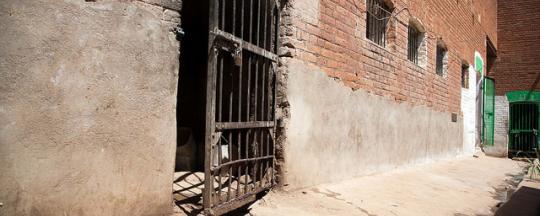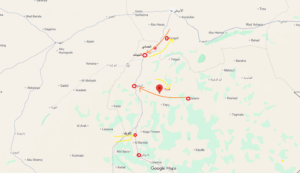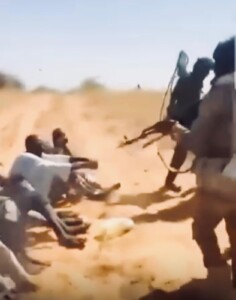ACJPS reports torture death of eastern Sudanese businessman

Prison cell in Darfur (File photo: Albert González Farran / UNAMID)
The African Center for Justice and Peace Studies (ACJPS) earlier this week expressed its “deep concern” about the increased targeting of civilians in eastern Sudan’s Kassala by members of the General Intelligence Service (GIS).
“We want to echo the residents’ voices and demand that the authorities in Kassala hold the perpetrators of these violations accountable” and bring them to justice, ACJPS on Tuesday said in a new report about “grave human rights violations” committed by GIS officers against civilians in Kassala.
On August 30, a group of armed men wearing in plain clothes, suspected to be GIS officers held businessman El Amin Nour from his family home in Wad Sharifi, about 13 kilometres from Kassala city. He was taken to the GIS offices in the state capital where he was questioned and detained.
Nour who belongs to the Beni Amer ethnic group, owned a restaurant in Wad Madani, capital of El Gezira, before he returned to Kassala after the Rapid Support Forces (RSF) took control of the state south of Khartoum in December last year.
An anonymous source close to the restaurant owner informed ACJPS that Nour was accused of working with the RSF as an informer and that this could have been the reason for his detention.
On August 31 at around 01:00, the same group of armed men returned to Nour’s family home, with his body. His relatives refused to receive the body and demanded that it be taken to the mortuary, so that the cause of death could be investigated.
That day and the following day, youth groups from the Beni Amer, Habab, and the Rashaida tribe in Kassala, lawyers, members of Kassala resistance committees, the Sudanese Alliance party, the Free Lions Party, the Sudanese Congress Party (SCP), and the Forces for Freedom and Change all called for accountability for the actions of the GIS officers in the state.
Some of these groups took legal actions against the men who detained Nour, while the youth groups held peaceful protests in front of the GIS building in the city. The protesters also called for the closure of the Kassala Grand Market during the month of September, in a bid to exert more pressure on GIS and the authorities in Kassala to respond to the demands for accountability.
On September 2, the day Nour was buried, the GIS office in Kassala shared the names of five officers suspected to have been involved in the death of Nour Alamin with the public prosecutor in the city for investigation.
The lack of accountability by the authorities in Kassala has been fertile ground for continued human rights violations against civilians in the state, ACJPS states in its latest report.
Beni Amer youth have several times been targeted for allegedly collaborating with the RSF. On 18 December 2023, for instance, five youths working at a bakery in Wad Madani were detained by Military Intelligence agents as they were suspected of being RSF affiliates. They were released after the head of the Beni Amer, a Beja tribe living along the border with Sudan and Eritrea, intervened.
Radio Dabanga has reported several times about detention campaigns by Military Intelligence, GIS, and by the RSF of people, mostly human rights defenders and civil society activists, yet also often only on ethnic grounds, since the war erupted nearly 17 month ago.
Ahmed El Kheir
The ACJPS further mentions the case of schoolteacher and human rights activist Ahmed El Kheir who was tortured to death in Kassala in early February 2019, and who has become a national symbol of the victims of security and intelligence officers.
El Kheir was taken from his home in Khashm El Girba, a town located about 70 kilometres south of the state capital and detained at the office of the infamous National Intelligence and Security Service (NISS*) in the town. He died after having been tortured and sodomised.
A source close to the deceased shared with ACJPS that El Kheir was targeted for participating in several peaceful protests during the December 2018 Revolution. With the efforts of activists and lawyers, at least 15 NISS officers were tried and sentenced to death for the custodial death of the schoolteacher. “Unfortunately,” ACJPS notes, all 15 convicts fled from Kober Prison in Khartoum North (Khartoum Bahri) shortly after the outbreak of the devastating war between the Sudanese Armed Forces (SAF) and the RSF on April 15 last year.
Thousands of inmates were freed a few days later after men wearing RSF uniforms launched attacks on several prisons in Khartoum state. These released also included several prominent Islamist hardliners who had been convicted during the civilian government headed by PM Abdalla Hamdok.
* The National Intelligence and Security Service (NISS) was one of the most feared organs of the Al Bashir dictatorship, which acted ruthlessly against any political dissent. It was disbanded in July 2019, after the ousting of the Al Bashir regime (1989-2019) by constitutional decree “restructuring the security apparatus, to cope with the political change in the country”. Several articles of the 2010 National Security Act were amended and the name of the security apparatus was changed into the General Intelligence Service (GIS) – which was no longer authorised to detain people or carry out search operations. Following the joint SAF-RSF coup d’état against the Hamdok government in October 2021, however, the GIS and Military Intelligence were given free reign again. In May this year, junta leader Abdelfattah El Burhan approved the amended National Security Act, which also grants Military Intelligence and GIS free powers of detention.











 and then
and then